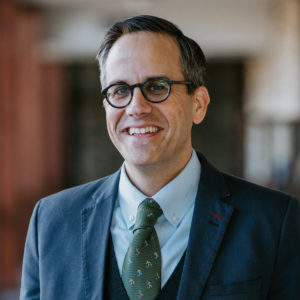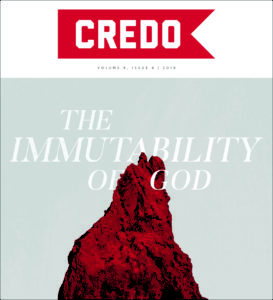Jason Duesing serves as the academic Provost and Associate Professor of Historical Theology at Midwestern Baptist Theological Seminary. He came to MBTS after serving for more than a decade on the administrative leadership team and faculty at Southwestern Baptist Theological Seminary in Fort Worth, Texas. Duesing earned his Ph.D. in Historical Theology and Baptist Studies from Southwestern Seminary in 2008. He is the author of several books including Mere Hope, Henry Jessey, First Freedom, and Seven Summits in Church History.
You’ve devoted your life to the study of church history. If you had a Mount Rushmore of Christian figures that have influenced you most, who would those four be?
That is a challenging question. I will choose one from each major era: Athanasius, Martin Luther, Adoniram Judson, and J. I. Packer.
The insight of C. S. Lewis comes out in your teaching and writing. What has been the most influential C.S. Lewis book in your life and why?
C.S. Lewis’s chapter on the “Great Sin,” in Mere Christianity, was the most influential chapter of this influential book. It was instrumental to my understanding of the depths of my own sin and played a key role in my conversion to trust Christ as well as my early discipleship. I’ve written a bit more about this here. 
Like many Lewis readers, are you also drawn to J.R.R. Tolkien? What benefit is there to reading Lewis and Tolkien today?
Tollers and Jack were the best of conversation partners while they lived and remain helpful conversation partners for us still through their writings. As much as I enjoy their writings and the different ways in which their fiction helps illustrate true things about God and the Bible, I enjoy them and enjoy learning about their lives and how they lived as scholars, churchmen, and friends.
You are not just a historian but you are a Baptist historian. Is there a particular Baptist from the past that the church today needs to retrieve?
The seven churches in London that crafted the First London Confession remind us that Baptists are at their best when led by a movement of cooperating churches defining and defending what they believe the Bible teaches for the sake of future churches. Andrew Fuller, from the 18thcentury, stands ready to help us rightly place our vital soteriological conversions in service of missions. Charles Spurgeon, in the 19thcentury, is ready always to give us plenty to take up, read, find encouragement, act courageously, and find Christ. Carl F. H. Henry, of the 20thcentury, stands ready to remind us of not only the truthfulness and reliability of the Bible, but that the Bible is there to point the world toward our Risen Lord—so we should engage the world.
You’ve written a new book called Mere Hope: Life in an Age of Cynicism. Why is hope grounded in something real and not just in naïveté?
In 1 Peter 1:3-5, Peter aims to encourage his readers by underscoring that believers in Christ have been given a living hope. Regardless of their present circumstances, Christians have been regenerated and given a hope that is the very opposite of fear of the future. What does it mean that this hope is alive? Peter adds that the hope comes “through the resurrection.” That is, the hope that is given to believers through regeneration is grounded not merely in a series of propositions about what we can know and read as true—though it is grounded in such. More than merely what we can know, the hope that dwells within us is grounded in the resurrection power of Jesus Christ. As A. T. Robertson shares, “Hope rose up with Christ from the dead.” As sure as the grave is empty, our hope is alive—as alive as Jesus. As sure as the grave is empty, our hope is alive—as alive as Jesus. Click To Tweet
How does the belief in mere hope speak into the Christian’s pursuit of holiness?
The call to discipline ourselves for the pursuit of godliness (1 Tim. 4:7) is an imperative of the Christian life. But as we pursue holiness and godliness, what frame of mind are we to have? We often are prone toward a stoic approach of “gutting it out”—the “Well, I’ve got to read this, memorize this, listen to this” approach. Yet, if we pursue holiness from the fruit of the gospel, remembering first what we know to be true about God and ourselves in Christ, then the desire comes to memorize God’s Word, to be in God’s Word, to pray, and many other disciplines. Absolutely, we are to pursue holiness, and to do that in a systematic and disciplined way, but as a result of the hope we have in the gospel, not in pursuit of it.
In this issue of Credo Magazine we are focusing on God’s immutability. How does God’s immutability ground not only our present hope but our future resurrection hope?
The world in which we live at present is wrong-side up and our hearts naturally along with it. Without the intersection and intervention of God’s new mercies, both redemptive and restraining, we are desperately sick (Jer. 17:9), prone to wander and lose hope.
But, as we lament these things—and we should grieve and lament the sin in our lives and in the world–lest we fall to the temptation that God is smaller than the evils in the world, we should also not fail to call this to mind:
God was, is, and will be the same (Heb. 13:8). He does not change (Jam. 1:17). God is our refuge and strength, a very present help in trouble (Ps. 46:1). His mercies are still new every morning even as we await our Blessed Hope, the Lord Jesus, who gave himself to redeem us (Titus 2:13-14). We have a God that is bigger than the world and all that is in it. Believers in Christ uniquely and always have this message to share.
You’re an avid outdoorsman and fisherman. What is it about fishing that you love so much?
As Izaak Walton said in The Compleat Angler (1653), “Rivers and the inhabitants of the watery elements are made for wise men to contemplate and for fools to pass by without consideration.” And, as Walton said, I don’t consider myself in the first category, but seek to make sure I am not often in the second.
Where is the best fly-fishing spot in the U.S.?
Wherever the water is cold enough for trout to thrive. Yet, if in doubt, go to Montana.
You live in Kansas City, home of the Royals. Yet, you are a New York Yankees fan. Do you wear a Yankees hat when you go to watch the Royals? What Yankee do you enjoy watching play the most?
Yes, I do wear my Yankees hat, as I wear it most places, but not always to the Royals games—it is not very popular there!
I am a fan of the game and, especially, the American League. I moved from Texas to New Jersey for the 4thand 5thgrades and then back to Texas. The Yankees were not all that great then, actually, but were a team I could follow no matter where I lived, and the history and legacy of that team is enjoyable to learn about and follow. But it is the game itself that is a fun avocation. As the late Bart Giamatti said, there is something about “the game’s deep patterns, three strikes, three outs, three times three innings, and its deepest impulse, to go out and back, to leave and to return home, to set the order of the day and to organize the daylight.”
My favorite players to watch today are the utility infielder, Ronald Torreyes, who can turn on any fastball, and the pitcher David Robertson, who has the best curveball I’ve ever seen.
Image credit: Pierre Doyen – Paris, Van Gogh


